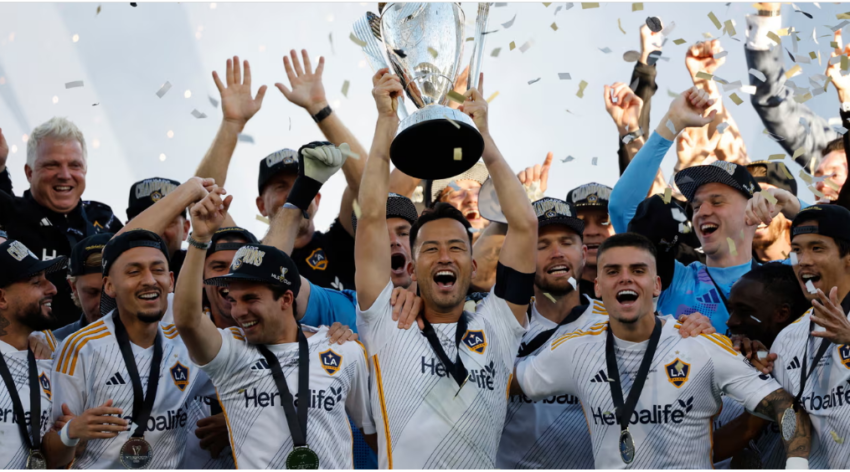Lionel Messi was not present when the Major League Soccer champions were crowned in December. He, Luis Suárez, Sergio Busquets, and the rest of the Inter Miami galácticos had been dispatched in the playoffs. Instead, the new kings of US football were the old aristocrats of LA Galaxy, back on top after a 10-year absence, but without a household name in their ranks.
The team that brought you Beckham-mania, staged the Captain America show, and gave several people Zlatan-itis had retaken the summit of the US club game with a roster of unheralded talent. But the twist was more profound than that: this 180-degree turn on strategy was brought about by fan activism after supporters went on strike to force the club to change their approach.
“We had a period where we struggled a bit,” says Tom Braun, the Galaxy president of business operations, whose job it was to take fans’ frustrations on board. “After a decade, I think our fans got a little … they pushed us in a good way. They pushed us to be better.”
Braun was promoted into his role two years ago after a period of remarkable upheaval at Galaxy. In 2022 the then president, Chris Klein, had been suspended by MLS for breaching salary guidelines, seemingly to squeeze more star names into his squad. Galaxy’s response was to renew his contract and what had been a protest, including the time-honored activity of trailing a banner from a plane calling for Klein’s dismissal, expanded into a fan boycott. Galaxy’s five distinct fan groups came together to insist they would not return to watch the team until “change is made at the highest level”. That season, average attendance at the Dignity Health Sports Park fell by more than 10%.
Klein was let go in May 2023 due to the team’s declining support and position at the bottom of the Western Conference of Major League Soccer. Braun then stepped into the front office and sought to re-establish relations with supporters. The strategy was known as “fight for the fan” and the fight was necessary. Braun argues, however, that the focus on the nitty-gritty was more important than big announcements when it came to regaining trust. According to Braun, “We created a fan council, which is approximately 17 people, from season ticket members to single-game buyers to people who may have different accessibility needs to get their vision.” They wanted to improve all aspects of the fan experience. So we enhanced [the pre-match entertainment offering] Soccer Fest. We’ve brought in DJs. We’ve increased ingress so you get in better and faster. We changed out all the seats in our stadium. Although it’s not always fun to talk about, we made improvements to the restrooms, which were important to our fans. As a result, we listened to them and made the changes. The changes were made, and the fans came back. Ticket revenues rose by 38% on the previous season, but more importantly, the returning support created an indomitable atmosphere inside the ground. Galaxy went unbeaten at home in the regular season in 2024, with 13 wins and three draws.
Fans also identified with a team that had moved away from star names. In 2023 Galaxy’s three designated players were the one-time Manchester United striker Javier Hernández, the former Bayern Munich winger Douglas Costa, and the Barcelona youth graduate Riqui Puig. Hernández and Costa left in 2024, and Joseph Paintsil and Gabriel Pec, less well-known prospects, joined Puig. “We had a history of signing recognizable big-name talent,” Braun says. “Now, while we still have players like Marco Reus who possess that quality, we have also signed younger players who are demonstrating their talent. At the moment, the galaxy is making stars rather than taking them. Galaxy are hardly the only MLS club to have re-evaluated their recruitment strategy. The average age of players in MLS fell for the second consecutive year to 26.13 in 2024, when 150 players aged 22 or younger made at least one appearance. The trend for greater youth emulates the direction of travel in Europe and Braun says it is a sign of MLS’s maturity.
The league is only 30 years old and a lot of the time has been spent in educating our fans on what it’s about,” he says. “I think we’re moving past that now. I think we’re showing that this is a competitive league. That has, in my opinion, been a problem for soccer in the United States in the past, but MLS has grown significantly. It is only going to elevate what we are doing going into the World Cup in 2026. I think more players are going to continue to choose our league. The level of our players and the level of engagement of our fan base will, in my opinion, continue to rise. Unlike Messi’s Miami, Galaxy did not receive an invite to this summer’s expanded Fifa Club World Cup. “I think for winning our domestic championship, it would have been nice,” Braun says, though he backs the competition and, particularly, the opportunity to have more competitive fixtures against overseas clubs. “Any time you can compete against teams from different nations teams is a great opportunity,” he says, “but your team needs to show success and win these trophies.”
Galaxy may have dialed down the big names and turned up the customer service, but Braun says the club’s core identity remains the same: it’s about winning.
“We identify as being a very successful club and winning as a club in our league,” he says. “We signed big players with big names that helped us to get to this point. However, it is common knowledge that the LA Galaxy is a successful and significant soccer brand. We’re continuing to find ways to build upon that by winning.”
